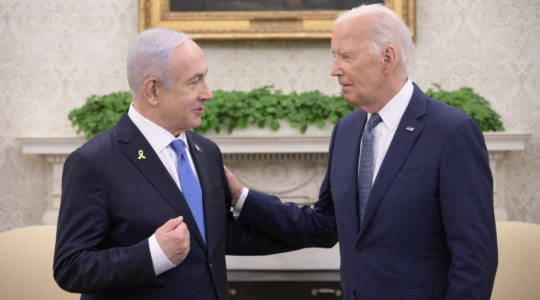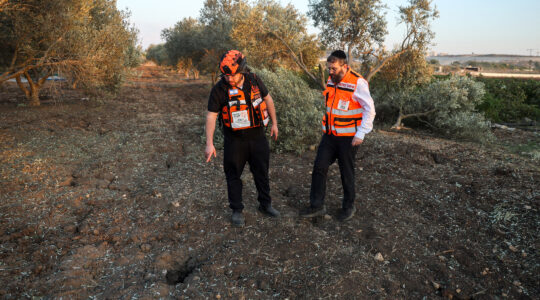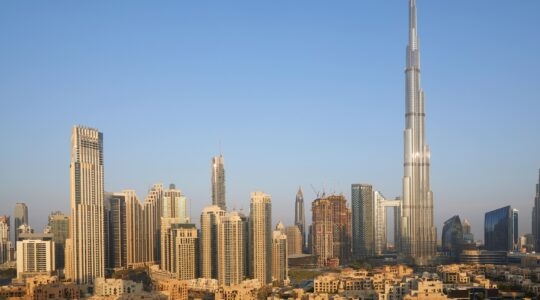JERUSALEM, Dec. 18 (JTA) — In calling for elections, Palestinian Authority President Mahmoud Abbas has sharpened the choice facing the Palestinian people: Back his Fatah party and have peace with Israel and the promise of economic prosperity, or support the rejectionism of Hamas, whose nine months in office have brought only war, chaos and impoverishment.
Abbas’ call Saturday for early elections in the Palestinian Authority triggered fierce street fighting between Fatah and Hamas, which won the last election in January. Despite a hastily arranged cease-fire Monday, the two factions remain on the brink of civil war.
The United States, Israel and other Western countries are hoping for a Fatah election victory that could pave the way for a resumption of Israeli-Palestinian peace talks. The United States is actively helping Fatah, but Israel — fearing that support for Fatah will backfire and undermine the moderates — is staying out.
The turmoil in the Palestinian camp comes as Syria launched a new initiative for peace with Israel. Peace with Syria would be a major strategic gain for Israel, breaking up the Iran-Syria-Hezbollah-Hamas axis, and it would put additional pressure on the Palestinians to cut a deal with Israel.
But Israel is not biting. Prime Minister Ehud Olmert does not trust Syria’s intentions and does not want to cross President Bush, who opposes dealings with Damascus.
The internal Palestinian struggle and the Syrian overtures are both part of a greater regional struggle for hegemony, pitting Iran and radicals such as Syria and Hamas against Western-leaning moderates such as Egypt, Saudi Arabia, Jordan, Israel and Abbas’ Fatah. How the Palestinian struggle plays out, and whether Syria comes over to the moderate side, will have major implications for Iran’s position in the region.
In his speech Saturday calling for elections, Abbas launched a scathing attack on Hamas’ policy of violence and non-recognition of Israel.
“The settler land” — parts of Gaza that Israel evacuated last year — “should have flourished with economic, tourist and agricultural projects, but some people insist on firing rockets,” he scoffed. “They kidnapped the Israeli soldier,” a reference to Cpl. Gilad Shalit, who was abducted by Gaza gunmen last June. “And since then they paid with 500 martyrs, 4,000 wounded and thousands of homes destroyed.”
The subtext was clear: Violence is getting the Palestinians nowhere, while peace moves could bring economic reward.
But Abbas did not set any date for elections. Analysts say he hopes to use the threat of elections to pressure Hamas into forming a national unity government with Fatah. That might enable the Palestinian Authority to accept the international community’s benchmarks for dialogue — recognition of Israel, acceptance of past agreements and renunciation of violence — paving the way for peace talks and the lifting of the international economic boycott of the Hamas-led Palestinian Authority.
Some Hamas leaders are in favor of this. Others still hope to circumvent the boycott by bringing in Iranian money.
P.A. Prime Minister Ismail Haniyeh of Hamas was intercepted recently trying to smuggle $30 million from Iran into Gaza in a suitcase. Indeed, Hamas strategy is built on financial and political ties with Tehran.
“Iran gives us strategic depth,” Haniyeh declared during a recent visit to Tehran.
The thinking behind this is the basis for Hamas rejectionism. Hamas leaders believe that if they can hold out until Iran gains regional dominance, they’ll be able to defeat Israel. Therefore, they argue, any attempts to make peace with the Jewish state are short-sighted.
The fighting on the streets was the worst between Fatah and Hamas in years, with children caught in the crossfire. Leaders on both sides also came under fire: There was a shooting attack on Haniyeh’s convoy as he returned to Gaza from Iran. Hamas blamed Fatah strongman Mohammed Dahlan and threatened to assassinate him. Later, mortars were fired at Abbas’s presidential compound in Gaza.
Pundits say the slide into civil war can only be averted if there is an agreement on holding elections or if a unity government is formed. Hamas has been adamantly against elections, describing Abbas’ call for an early ballot as an “attempted coup” against a legitimately elected government.
Despite efforts to reach a compromise, analysts argue that an eventual showdown is inevitable, since the two groups’ basic positions on Israel and the nature of a future Palestinian state are irreconcilable.
As both sides prepare for armed conflict, the West is openly backing Fatah. The United States has pledged funds, and an American general, Keith Dayton, is training Fatah forces.
British Prime Minister Tony Blair visited Ramallah on Monday to back Abbas’s conception of peacemaking as something that brings significant economic benefits. By outlining a vision of economic prosperity, Blair hoped to convince the Palestinian people that Abbas’ approach has a good chance of success.
Abbas also has the backing of moderate Arab states such as Saudi Arabia, which is providing funds, and Egypt, which reportedly is supplying weapons.
Syria, however, continues to host Hamas leaders in Damascus, and that is one of the reasons Israel is wary of its new peace offer.
The Syrian peace rhetoric was unprecedented. In an interview with Italy’s La Repubblica newspaper, President Assad invited Olmert to meet him and test his intentions, while Syrian Foreign Minister Walid Muallem told the Washington Post that a commitment to return the Golan Heights was no longer a precondition for talks.
Israeli leaders are divided on how to respond. Olmert, and most of the government, argue that Syria must first show whether it’s on the side of Iran or the West. It can do that by expelling Hamas and other terrorist leaders from Damascus and stopping its meddling in Iraq and Lebanon.
Others, in Labor, the left and the fervently Orthodox Shas Party, say Israel should use the chance to engage Damascus and try to swing it to the moderate camp. In a briefing of the Knesset’s Foreign Affairs and Defense Committee, Mossad Chief Meir Dagan came down firmly on Olmert’s side, arguing that Syria isn’t really interested in peace but simply wanted to use talks with Israel as a means of easing Western pressure.
Some pundits argue, however, that Olmert is making a huge strategic blunder. The most scathing was Ma’ariv political analyst Ben Caspit.
“I wonder what Ehud Olmert will say to the members of the next commission of inquiry — the one that is set up in two or three years time after war with Syria or after it becomes clear just how big a chance was missed to split the axis of evil and isolate Iran,” Caspit wrote.

Help ensure Jewish news remains accessible to all. Your donation to the Jewish Telegraphic Agency powers the trusted journalism that has connected Jewish communities worldwide for more than 100 years. With your help, JTA can continue to deliver vital news and insights. Donate today.





